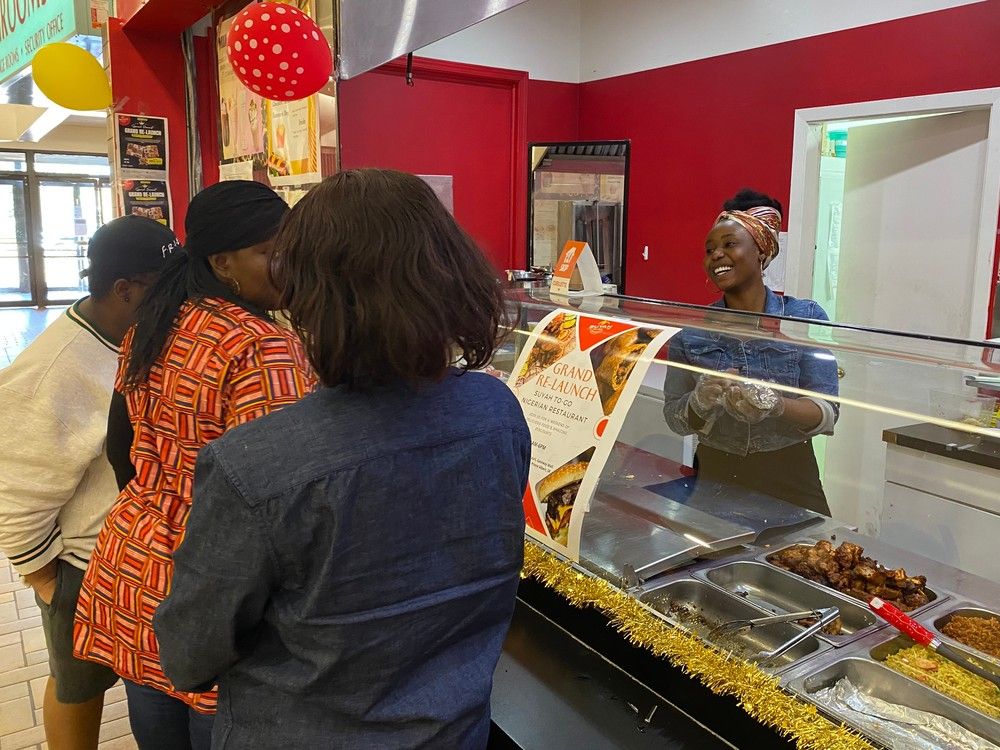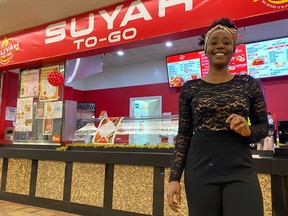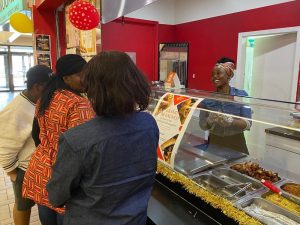
A few months into the launch of her Nigerian restaurant in Prince Albert, Shalom Ogoh wasn’t sure if it was going to take with the locals.
The Nigerian-born businesswoman with a degree in economics had opened a food kiosk at Prince Albert’s Gateway Mall coming off the heels of the COVID-19 pandemic. She was drawn to Prince Albert upon the recommendation of family in the city, but also by the fact that restrictions were moderately more flexible there during the pandemic and small-town living by comparison is much more affordable, she said.
She felt an initial coldness in her start as a business owner in Prince Albert, a stark contrast to her career in hospitality across cities like Vancouver and Toronto, Ogoh said.
“You have be friendly to receive that friendliness, you have to be warm to receive that warmth, even in the sense of opening an ethnic restaurant here.”
Slowly but surely, she made inroads. She persevered. And earlier this month, Ogoh celebrated the one-year anniversary of her business: Suya To-Go. Ogoh, all smiles with her hair tied up in a colourful silk scarf, said she thinks her business has made it because of her effort to be inviting.
“If you smile at someone, the person automatically smiles at you.”

A pair of young men sitting nearby, both from Nigeria, said “of course” they regularly eat at Suya To-Go. It’s our people, they added.
Ogoh is one of a growing number of Nigerians in Prince Albert. Overall in the city, 8.5 per cent of residents are from a minority group. In Saskatchewan, the largest proportion of immigrants is in Regina at approximately 20 per cent, followed by Saskatoon at 18 per cent. The next largest bases of immigrants are in the south, in Swift Current and Estevan.
Economic migration is the leading source of relocation in Canada. Economic migrants make up about 75 per cent of the country’s population growth. It’s estimated that by 2036, immigrants will represent up to 30 per cent of the population. Immigrants were 20 per cent of the population in 2011.
This year, Saskatoon has joined cities worldwide in hosting an event called Welcoming Week, which seeks to help immigrants integrate into their new cities.
“One thing that happens when immigrants come here is that they are leaving a lot behind. They are leaving family behind, they are leaving friends behind, so welcoming week is an opportunity help them feel at home,” said the City of Saskatoon’s immigration partnership coordinator, Jasmine Calix.
The event, which wraps up this weekend, presents immigrants with various opportunities to learn about their new home, integrate into the community and connect to the multicultural diaspora. The city also recently published an employment resource guide that gathers information into one place to help newcomers find work in their certified professions.
“They come here with lots of expertise in their field, and as long as they allowed to work in their field, that benefits those of us who live here,” Calix said.
Immigration has been one solution sought by the federal government to assuage acute labour market shortages, in part due to the aging population. According to the 2021 census, upwards of 23 per cent of the national population is immigrant. That’s a new record, with more than 401,000 new permanent residents. The previous records dates back to 1913.
Immigrants also account for 36 per cent of physicians in Canada, as well as 33 per cent of business owners with paid staff.
A fellow Nigerian has helped Ogoh establish her business further in P.A. Fumnanya Mordi is from Delta State in southern Nigeria. She moved to Prince Albert to complete a postgraduate degree in business management at Saskatchewan Polytechnic. Mordi later started a communications and marketing consultancy business and has been promoting the one-year anniversary of Ogoh’s restaurant.

Nigerian food is still the primary offering from Ogoh. But just as she has introduced her food and culture to the market, she’s also adapted to the local clientele.
Her menu includes North American staples like burgers and tacos. She says panfried bannock is popular with her Indigenous clientele, which makes up 80 per cent of her customer base.
“For me to be able to draw my customers in, I needed to be caring enough to offer something of theirs that they love so much,” she said.
Over time, most customers started to order Nigerian food as well, she said.
“I’m starting to love it here,” she said. “It definitely took me a while, but I would say I’m more comfortable now.”






